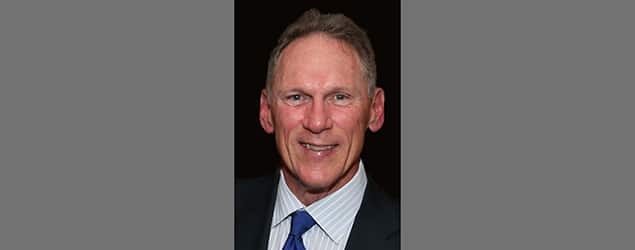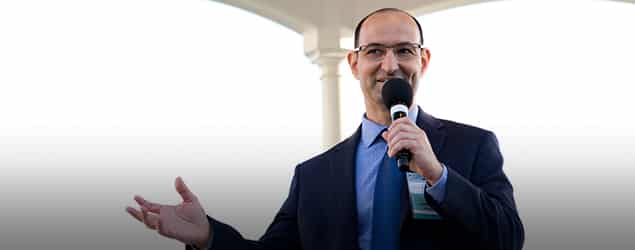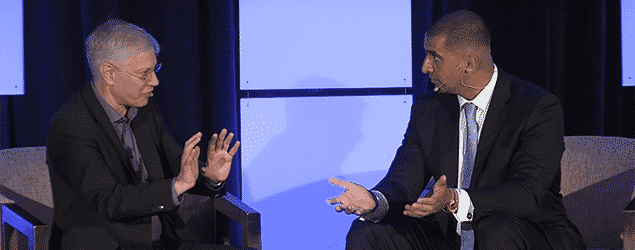Get to Know Jim Brown, ARI’s New CEO

Earlier this month, ARI announced the selection of its new CEO, Jim Brown. Jim has been an Objectivist for nearly fifty years, a donor and a participant in ARI activities and causes for the last eighteen years.
Jim’s diverse professional experience will be a valuable asset to the Institute. He recently served as a partner at Brandes Investment Partners, capping a thirty-year career in finance. Prior to this time, Jim served in the United States Air Force as a pilot, flight instructor, flight commander and squadron commander. He is a Chartered Financial Analyst and holds a Bachelor of Science in political science from the United States Air Force Academy and an MBA from Harvard Business School.
In this interview, Jim recounts how he first encountered Ayn Rand and how Objectivism has influenced his life for the better. He also provides a glimpse into what his vision and strategy will be for ARI.
How did you first encounter Ayn Rand?
I came from a big Irish Catholic family. I went to Catholic high schools and took their religion classes seriously. I remember that even at a very young age I was interested in comprehensive explanations to questions about existence and morality — and the questions always had a philosophical orientation. So I was fascinated with the structure of Catholic theology and its comprehensive explanations. But as I grew up I became very aware that the Church could not reconcile faith and reason, and so I had some doubts. After high school, I entered the Air Force Academy, and on the first day of freshman English, the professor, an Air Force officer, recommended three books to the class, two of which were The Fountainhead and Atlas Shrugged. I didn’t have time to read them then, but kept the titles in my head.
Then, a few months later, I decided I was an atheist, and that happened as follows: I used to go to chapel every morning to pray for my father, who was an Air Force fighter pilot stationed in Thailand, flying dangerous missions over North Viet Nam. One morning while praying, I just stood up and walked out, sort of berating myself for being so foolish as to think anyone was listening to my thoughts. That’s how I dropped religion — gradually, then suddenly. The point is, I was mentally ready for a new way of thinking about morality and philosophy.
Anyway, the following summer I remembered my professor’s recommendation, picked up The Fountainhead and, like many other first-time readers, could not put it down.
What was your first impression of her writing and her philosophy?
I was hooked from the very beginning. After The Fountainhead, one book led to another. I read Atlas Shrugged and We the Living, then Ayn Rand’s nonfiction books. There were lots of lively discussions with my brothers and friends who also had an interest in philosophy. I wanted to learn more and go deeper into her works. I went on to pilot training and an Air Force career, and throughout, I tried to read everything I could get my hands on related to Objectivism and Ayn Rand. And that interest only grew stronger through graduate school and a career in the financial world.
How has Objectivism influenced your life?
It’s always there. For example, the philosophy influenced how my wife Kathy and I raised our children. We tried to impart in our kids a sense of independence in every aspect of their lives—moral, financial and emotional. It’s the greatest gift you can give to a developing child. I owe that thinking to Objectivism. I have two brothers who are Objectivists and it’s been one of the great joys of my life to consider them my closest friends and intellectual allies. In recent years, I’ve had a number of friends express a growing interest in Objectivism as a result of the financial crisis. They’ve seen the world crashing and when they read Atlas Shrugged, they understand why. So I feel that Ayn Rand’s philosophy continually surrounds me.
How has Objectivism influenced your career?
I’ve always been very interested in economics and business, so it was a natural professional path for me. I see economics as a great entry point into Objectivism. Understanding free markets and capitalism helps one make sound financial decisions, and it’s helped me to properly advise others on how to make investment choices. The epistemology that Ayn Rand provided is extremely helpful in understanding and untangling financial markets, and I feel it’s been a major component in my success.
Why were you interested in stepping into the role of CEO at ARI?
ARI posted the job right after I retired from the Brandes partnership and was considering other career options. I thought: “If not me, who? If not now, when?” So I threw my hat into the ring. After a number of interviews with the ARI board, it seemed like a good fit from both sides of the table — so here we are!
What will your strategy be as ARI’s new CEO?
In early 2016, ARI’s executive team and the board of directors created an excellent strategy document that will serve as our guide in the years ahead. It’s comprehensive — very broad in mission and scope. That means it is challenging to execute, but it also allows us to be creative and flexible. The strategy document will be our touchstone, or standard, for determining where and how to fulfill our mission, which is to promote awareness, understanding and acceptance of Objectivism.
One aspect of our strategy that is new is an emphasis on the Objectivist community. ARI’s Onkar Ghate wrote an excellent section on Community in our strategy document, and it’s a theme that received significant emphasis at OCON 2016. It appears our audience responded well to this theme, as OCON registrations are already at a record high for 2017.
Community, which refers to what I would call the social culture within the Objectivist movement, is an area where we can effect change, meaning we can improve it. A greater sense of community has the potential to magnify our influence on the wider national culture. That improved community is alive and well here at the Ayn Rand Institute, where we emphasize a welcoming, friendly attitude toward everyone sincerely interested in Ayn Rand’s ideas. We have such rich philosophical content here, and we’re creating more all the time. Getting it “out there” to add value to the lives of intellectuals, young people, business people and other community leaders is critical, and I believe projecting a benevolent, optimistic attitude will not only help us do that but allow us to have more fun while we’re at it!



